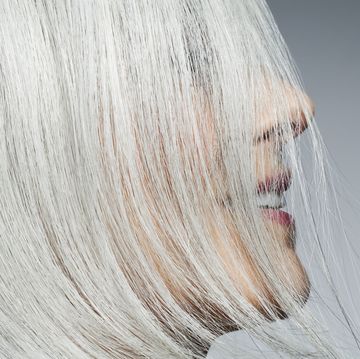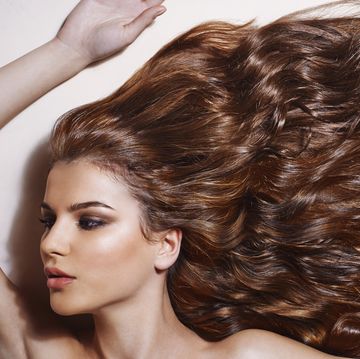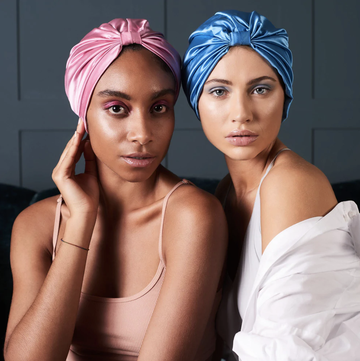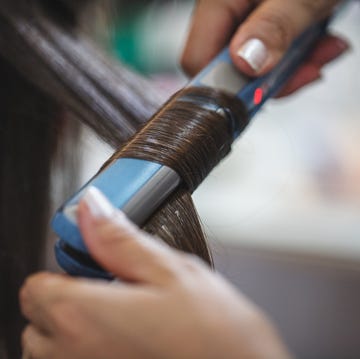When Black-owned hair care company Mielle Organics was acquired by consumer goods giant Procter & Gamble in January, the news spread like wildfire—and many fans weren’t happy. “Let me hurry up and stock up on my Mielle products before it really runs out in stores, the prices go up, and they change the formula to work for ‘everyone’…” one disgruntled Twitter user commented.
It felt like a familiar story: Founders of beauty brands originally created to meet the needs of people of color have faced similar outrage in the past after selling their companies to large conglomerates.
But while fans fear their favorite products will become less effective or available, founders say that selling is one of the fastest ways to succeed and begin to amass generational wealth. Some would argue that it’s not just about their own bottom line, either: These kinds of lucrative deals often result in more infrastructure, allowing Black-owned brands to reach even larger customer bases. And with their newfound success, founders can support emerging Black-owned businesses down the line, helping to cement an additional lane of access for the community. Still, the process can feel like a tightrope walk for entrepreneurs.
“When it comes to Black-owned companies selling to conglomerates that are not Black, some Black consumers are upset because there’s a feeling that this thing that belongs to us is being taken, changed in order to sell it to everybody else,” explains Carol’s Daughter founder Lisa Price. Price says she understands where that sentiment comes from, since so many ideas that originated in Black culture have been appropriated by others for social or monetary gain.
After SheaMoisture and Carol’s Daughter were sold to Unilever and L’Oréal in 2017 and 2014, respectively, fans took to social media to accuse the brands of reformulating some of their most beloved products, sharing side-by-side photos of differing ingredient lists. To date, neither company has confirmed whether the products were altered to cater to other hair textures, or at all.
Hair care is particularly fraught, because consumers wearing natural and protective styles often gravitate toward products they know will meet their specific needs. “In hair care, it’s different, because they have no choice: If you have textured hair and want to take care of it, you have to use a Black-owned brand, because they’re the ones who understand your hair,” says Sharon Chuter, founder of cosmetics and lifestyle company UOMA Beauty. “So there’s a speciality thing there; that’s why with hair care brands, they really boom, they get exits.”
Currently, the number of Black beauty-brand founders who have successfully sold their businesses can be counted on one hand. But consumer backlash has been a prominent part of their stories. “It’s unfortunate that a lot of Black-owned brands get backlash when they sell, because it’s one of the few arenas where you see that dynamic,” says Briogeo founder Nancy Twine, who sold her hair care business to Wella Company in 2022. “You see tech founders raise money, sell their companies, and get cover stories in magazines. I think there’s a lot of upset about the fact that you can’t really call the company that you’ve been supporting ‘Black-owned’ anymore.”
The discourse has picked up in recent years due to a resurgence of interest in Black-owned beauty brands, after the Black Lives Matter protests of 2020. From added diversity in company marketing campaigns to hefty charitable donations, more corporations than ever vowed to show their support for the Black diaspora. This, of course, is positive, but it has also fostered a business environment in which Black entrepreneurs are facing larger questions about what success really means—often for the first time.
Twine notes that since launching her company, she’s seen firsthand an outpouring of support from beauty retailers for Black-founded brands, especially within hair care. “I see the valuations that some of these brands are getting, I see the competitiveness of funds trying to get in—it’s actually really incredible,” she says. “I think that has also been fueled by the fact that big beauty retailers like Sephora and Ulta have taken the Fifteen Percent Pledge, so investors know that they’re committed. They’ve created accelerator programs to help support Black-owned brands, so, I think that sort of 360 commitment to supporting Black founders has really created this strong ecosystem.”
But newfound industry buzz is often coupled with increased consumer demand, which can feel like a double-edged sword for smaller businesses lacking adequate resources to respond to it. Chuter, whose cosmetics company went viral and later expanded through a partnership with Ulta Beauty in 2019, explains: “Many Black-owned brands that got taken into retail are actually struggling on the back end; they’re struggling to scale. They’re struggling to get investments, to operate in the ways retailers want them to, and also not getting the leeway of time to adjust.”
If you’re the founder of a small beauty company looking to scale up while growing your own nest egg, Twine adds that there are two realistic options: either keep raising money to the point where your influence is diluted and you hardly own any of the business, or sell, thereby maintaining equity, cashing out, and aiming to pass the baton. Since making the decision to partner with Wella, Twine says, she’s in a better position than ever to actively invest in other businesses—primarily with entrepreneurs who are Black and women of color— and to leverage her success as a tool to help others.
Often, when a big company acquires a brand, the brand’s founder stays on. “If you change everything, you wipe out your whole consumer base, which is exactly what they don’t want,” Price explains. (It’s also a good argument for not messing with the formulas; founders on the receiving end of these business deals all say it’s not in their best interest to overhaul an already good thing.) “The goal is to bring that company into the fold and help the company grow,” she goes on. “Whether the founder is Black, white, or Asian, the person selling is building generational wealth for their family. And for Black people in particular, that’s a really important thing, because it’s something that’s very disproportionate for us—we don't have the same generational wealth as our white counterparts.”
Monique Rodriguez launched Mielle out of her Chicago kitchen in 2014 and spent eight years painstakingly building the business with her husband, Melvin. She says their relatively new partnership with Procter & Gamble allows them more breathing room to further the company’s mission.
“We need the support, we need the resources to really help us scale,” Rodriguez told me in a phone interview. “I think people are starting to realize that there’s such a disadvantage in the African-American community, in terms of lack of resources. And there are people like myself who have finalized partnerships like these and are sharing this information to help bring up the community. We need more of us to do that. That’s how we’re able to change the narrative in our community and break generational curses.”
Rodriguez told me that if a powerhouse Black-owned conglomerate like Procter & Gamble existed, her company likely would have partnered with them instead. In the current business landscape, that’s simply not an option; there are only a handful of Black-led venture capitalist firms in existence, let alone conglomerates.
“I hope all Black beauty founders build something so spectacular that they can grow beyond their brands and move into new ventures,” holistic aesthetician and Klur Skincare founder Lesley Thornton says. “Change of ownership doesn’t necessarily mean the brand’s integrity is compromised. At a certain point, a company requires expert support and an extensive infrastructure to continue to serve its customers. A brand can successfully sell and maintain its integrity if the founder stays aboard long enough to see the vision through.”
Nikki Walton has been witnessing the conversation about Black-owned beauty brands for years from the point of view of a consumer; she founded Curly Nikki, one of the first online communities specifically for natural hair. “Some people dedicate their whole lives to their brands and don’t really get a lot out of their businesses,” she points out. “People can’t expect them to continue to sacrifice forever. Sometimes we have to allow people to check out and to elevate and move on without labeling them as a sellout. I see that more often in our community than in others—a lot of times, selling your company is celebrated, and you’re seen as a success if you’re acquired. But a lot of times, we don’t give ourselves that grace.”
In the end, Walton believes these types of business transactions are beneficial for both founders of color and their communities. “I think it absolutely transcends race—I think all small business owners have this feeling of ‘selling out’ when they exit their companies,” she says.
“Every situation is different: Some people may do their due diligence and maybe even institute some requirements as part of their acquisition. Some people may look at their deal as a transaction, but may also be looking to do more good with the money that they make after the acquisition. We don’t really know what’s going on behind the scenes, but we can hope that they give back to the community.”

Tiffany Dodson is currently the associate beauty commerce editor at Harper’s Bazaar, where she specializes in trend forecasting, building relationships with major and emerging brands, and crafting shopping stories—from holiday gift guides to product road tests. Tiffany's work has previously been featured in outlets like SELF, Bustle, and Teen Vogue, and she's been quoted as a commerce and beauty expert in publications and platforms like The Business of Fashion and NPR’s Life Kit podcast.
















